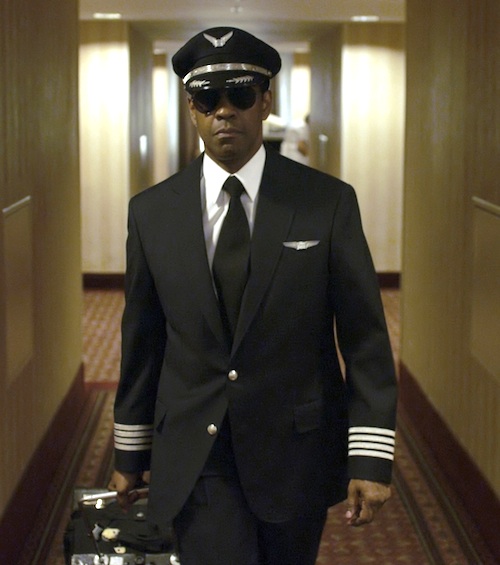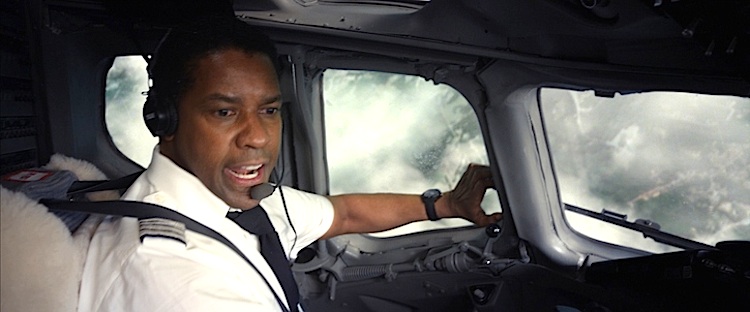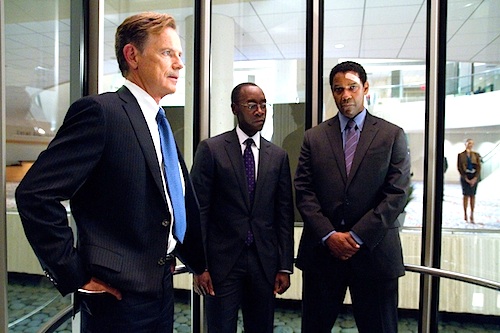
By Patricia Ducey. The three most important things in moviemaking are: story, story, story. That twist on the old real estate maxim (“location, location, location”) illustrates why Robert Zemeckis’s Flight stalls out and thuds to earth after an admittedly spectacular opening crash sequence and Denzel Washington’s superior performance.
First, Denzel: I confess that his early work, especially Malcolm X and The Hurricane, impress me more than his turn toward the anti-hero, as in his Oscar-winning role in Training Day as a despicable, corrupt detective – and he chooses another flawed character here in Whip Whitaker, the ace pilot with a tragic flaw: hopeless addiction.
Captain Whitaker awakens one morning in an anonymous hotel room, still drunk from the night before – his doughy, tattooed body looking a lot worse for the wear. He and his bedmate Trina have been up partying all night, and on her way out the door she urges Whip to hurry; they have a flight in a couple of hours. So Whip, with a last beer and a line of coke to chase away the beery fog, strides confidently through the airport to actually pilot 102 souls from Orlando to Atlanta on his Southjet flight.
His young copilot Ken (Brian Geraghty) is simultaneously in awe of the man and suspicious of his condition; Whip inhales a hit of oxygen and offers his young partner one too, which he declines. They take off into the rain, which soon grows into a thunderstorm and stomach-wrenching turbulence. But master pilot Whip pushes the plane to its limits and expertly guides them into the clear. Everyone on board breathes a sigh of relief. As they descend for landing, however, the hydraulics fail and the plane veers out of control and into a nosedive – and the passengers are thrown around the cabin like rag dolls. Whip takes control. He orders Ken and flight attendant Margaret (Tamara Tunie) to help him in a series of unorthodox maneuvers in a last, desperate attempt to land the crippled liner. Miraculously, he does just that. And despite his blood alcohol level, he has pulled off a landing that Sully Sullenberger would envy.
At this point, Flight is firmly planted in the social drama genre. Whip’s life revolves around his addition to booze and drugs, enabled by his denial and consummate skill in the air. He has already lost his wife and son due to his drinking problem, and his first thought post-crash is to summon his drug dealer (John Goodman) to his hospital bed with refreshments. The media dub him a hero, but he holes up in his ramshackle farm outside of town to avoid them – and the truth. We wonder if he will ever sober up, or if he will continue to escape responsibility for the crash. However, that is not enough to sustain two hours of story. He is already divorced and at rock bottom at the time of the initial crash, so there is no suspense in watching him play that single note.

The film then hints at legal drama. [SPOILER ALERT.] Six people die in the crash, including girlfriend Trina, a flight attendant, prompting a criminal investigation. [END OF SPOILERS.] But the NTSB investigation reveals that 10 pilots who simulated the crash flamed out and killed all souls on board – so the airline absolves him of blame, the press and his crew hail him as a hero. The legal and moral quandary is, then, is he free of guilt for the six deaths?
We anticipate Whip confronting the NTSB, the airline, the D.A. and wrongful death attorneys – in addition to his drinking demons — but all that action strangely takes place outside of the story. What a pleasure it would have been to see his smart and savvy lawyer (Don Cheadle) go mano a mano with the D.A. to suppress Whip’s blood alcohol report, or to watch Charlie (Bruce Greenwood), Whip’s union rep and friend, try to deal with his friend’s failings. I wanted to see Whip engage the bereaved families in a tense courtroom battle, and to experience the inevitable cross-examination by the crafty NTSB top investigator Ellen Block (Melissa Leo) – a fascinating character, before the last ten minutes.

Instead, we see Whip at the ranch with his new girlfriend, a fellow recovering junkie he met in the hospital, as Whip lapses and binges and tests the limits of her patience. But we don’t really feel any intimacy in this relationship; they only met a few days before — there are simply no stakes. Instead, she exists as a plot device to give Whip someone to bounce dialogue off of.
Strangely, too, Zemeckis injects lame humor in inappropriate places. John Goodman’s drug dealer character is a Boomer cliché; he sports a pony tail, totes his supplies in a briefcase and listens to the Rolling Stones on his iPod. Sadder still is the character of co-pilot Ken, wonderfully played by Geraghty, whose fear and rage flicker across his face like storm clouds aboard the doomed flight. What a waste that later, in the hospital, he and his wife suddenly veer off into cartoonish, Bible thumping, Jesus-freak ravings. Lastly, and most puzzling, is a shot in Whip’s hospital room. As he painfully inches out of his hospital bed, his hospital gown falls open in the back, revealing his bare derriere. As the camera lingers, we wait for a reaction from someone in the room — but, no, this joke is between the director and the viewer, and the “joke” is on Washington. Hospital gown jokes are as old as vaudeville—check out the cheesiest get well cards in your local convenience store—but just dumb in a melodrama like this.
In the end, Flight‘s story falls flat. The first and last ten minutes are very good, but in the end the acting and special effects are not enough. Washington can telegraph more with his vacant eyes about the loneliness of the addict than most actors could muster falling over furniture. His complex, understated and powerful performance outstrips the failings of the story. He has proven he is very good at being bad; we await a film worthy of these gifts.
Posted on November 17th, 2012 at 9:53am.